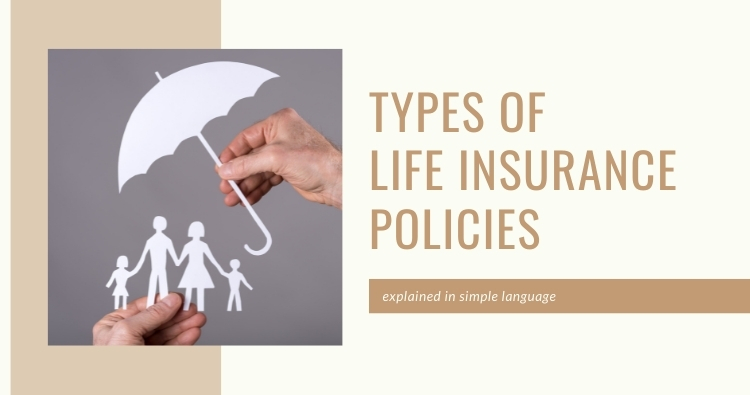- +91 8600270099
-



5 Types of Life Insurance Policies
When we think about money, the first thing that comes to our mind is investments and the rate of returns that these investment options can fetch. We tend to delay buying a life insurance cover as most of us believe that insurance is not useful. However, it is one of the essential steps of financial planning.
When you go to look for life insurance policies, you will find several types of policies that only increase your confusion.
In this article, we will explain about the different types of life insurance policies so that you can select the best policy for yourself and your family members.
But before we dive in the different types of life insurance policies, let us understand the meaning and importance of life insurance.
Meaning and Benefits of Life Insurance?
When you buy a life insurance cover, the insurance company promises to pay the sum assured life cover to your nominee after your death, in an exchange of a premium that you pay on regular intervals.
Depending on the type of life insurance policy, you may also receive the maturity benefits if you survive the policy term.
Life insurance is a priority if you are the sole earning member of your family or yourfamily members depend on you. It is because, in case of an unfortunate event, your family will receive monetary compensation as sum assured from the life insurance company.
An adequate life insurance cover will also help take care of your family member’s financial goals, such as children’s higher education.
Tax deduction on the life insurance premium paid is an added benefit of life insurance.
Types of Life Insurance
There are five main types of life insurance policies that individuals can take to avail life cover. The basic aim of a life insurance policy is to provide protection. However, there are a few insurance policies that offer a mix of insurance and investments.
The sum assured will also vary among the different types of life insurance policies. Before you get any type of life insurance, it is always best to understand the features and benefits of the life insurance policies.
1.Term Insurance
Term insurance is the simplest life insurance plan. It is a pure insurance product and the nominee will receive the sum assured after the death of the policyholder. It is one of the cheapest life insurance policy as the nominee receives the amount only at death. This means that there are no cash benefits on survival.
Term insurance offers a high life insurance cover at an affordable rate. Moreover, the premium amount is less if you take the policy at a young age. Also, you stand to gain in the long run as the premium amount remains same throughout the tenure.
2. Endowment Plan
The policyholder can select a policy term from 10, 15, 20, 30 to 40 years.
Endowment Plan islike term insurance policy and it is a combination of savings and insurance. It is similar like term insurance plan as the nominee of the policy will get the sum assured after the death of the policyholder. Moreover, if the policyholder survives the policy term, the policyholder will receive a lump sum payout on a fixed date. The policyholder can use the lump sum amount to purchase property, fund children’s education or take care of retirement, etc.
Endowment plans are expensive than term insurance plans as it comes with a higher premium as the policyholdersreceives maturity benefits.
3. Unit Linked Insurance Plan (ULIP)
ULIPs is a combination of insurance and investment. The aim of an ULIP is to generate wealth along with insurance cover. When you buy an ULIP, a part of the premium is invested in asset classes such as equity and debt instruments. The rest of the premium is used to provide insurance cover.
You can switch from equity and debt investments as per your risk appetite and market performance.
ULIPs have a lock-in period of five years. This means that you can’t redeem your money before five years.
4.Money Back Policy:
Money Back Policy is a mix of insurance and investment. While a regular life insurance plan pays a lump sum amount at maturity, Money Back Plans offer payouts at regular intervals during the policy term. The policy holder receives pay outs after a few years from the start of the moneyback plan, and it continues till the end of the maturity period. The benefit appliesif the policyholder is alive.
In case of an unfortunate event, the nominee receives the whole maturity amount. This is irrespective of the survival benefits that the insurance company has already paid out.
5.Whole Life Policy
The Whole Life Policy is valid for the entire life of the policyholder. The insurance company will pay the life cover to the nominee after the death of the insured person. The policy comes with survival benefits as well. Policy holders can also borrow money against the policy.
Conclusion:
Life Insurance is an important part of financial planning. Term insurance, endowment plan, ULIPs, Money Back Policy and Whole Life Policy are some common types of life insurance plans. You can consult us to know more.
This blog is purely for educational purpose and not to be treated as an personal advice. Mutual fund investments are subject to market risks, Read all scheme related documents carefully.
At Snehavi Investment, we truly care about our clients' goals - and we believe it shows in our attention to detail and service.
A-403, Arihant Anaya, Sec. 35,
Kharghar-410210 , navi Mumbai,
Maharashtra
+91 8600270099
Copyright © Snehavi Investments 2020. All rights reserved.